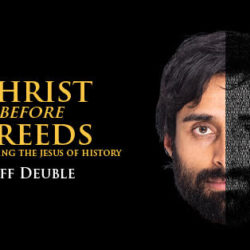Last week John Truitt explained why he believes the gifts of the spirit are still available for Christians to experience. Today, Greg Deuble pulls on his own biblical research and personal experience to present an opposing case. What’s fascinating about Deuble is that he believes in God’s miraculous activity in the world today. However, he doesn’t believe that speaking in tongues (glossalalia) is genuinely available anymore. Rather, based on his reading of 1 Corinthians 14.21-22, he makes the case that the purpose for tongues ceased the moment Gentiles destroyed Jerusalem, its temple, its people and dispersed them.

—— Links ——
- Check out Deuble’s website: TheBibleJesus.com
- Articles mentioned in this episode: My Experience with Tongues and Testing, Testing, One, Two…Nine
- More podcasts with Greg Deuble
- Other podcasts about speaking in tongues
- If you’d like to support Restitutio, you can donate here.
- Leave a voice message via SpeakPipe with questions or comments
- Intro music: Good Vibes by MBB Attribution-ShareAlike 3.0 Unported (CC BY-SA 3.0) Free Download / Stream: Music promoted by Audio Library







Are transcripts of these podcasts available?
Sorry Virginia, no transcripts.
I write as one who enthusiastically practiced speaking in tongues for a full forty-five years, before thoughtfully comparing my experience to a more reasoned, biblical perspective. To read a book which is similar to Greg’s view, check out: Tongues Will Cease … But When? by Raymond Faircloth
https://www.amazon.com/Tongues-Cease-Concise-Studies-Scriptures-ebook/dp/B07P3Y1VZS/ref=sr_1_1?dchild=1&keywords=tongues+will+cease+but+when%3F&qid=1611926930&sr=8-1
Especially for those (like me) whose tongues experience is rooted in the old Way International, and regarded as OSAS proof of being “baptized in holy spirit” and thus automatically “born again”, the following website study by Mark Clarke might be extremely relevant:
http://godskingdomfirst.org/SpeakingInTongues.htm
The Apostle Paul says there are “different kinds of spiritual gifts but the same Spirit” (1Cor 12.4), just like there is “one body and one spirit” (Eph. 4.4). This one Spirit produces all the gifts, distributing them to each member of the one body as God wills it (1Cor 12:11).
Paulls adds that “all the members do not have the same function [and] since we have gifts that differ according to the grace given to us; each member is to exercise them accordingly.” Rom 12:4-6
The Apostle Peter notes that each Christian has a responsibility “as a good manager of God’s different gifts, to use for the good of others the special gift he has received from God.” 1Pet 4.10
If you believe the Spirit is active irrespective of beliefs and practices, how will this serve the good of others who do not share said beliefs and practices?
In other words, we know that in general Trinitarian and Oneness claimants do not even consider us part of the body of Christ. So how would their claim and practice of spiritual gifts be for our benefit?
In 1Cor 12.10 Paul commands Christians to pursue wisdom and discernment, defined by him as the ability to distinguish between spirits.
This is essential in order to act upon the warnings we find scattered throughout the Bible from the Old (Deut. 13.1-3) to the New Testament (1 John 4).
This explains why Jesus says in Matthew 7:22:
“Many will say to me on that day, Lord, Lord, we prophesied in your name, drove out demons in your name, and performed many miracles in your name, didn’t we?”
Now Jesus did not say to them, ‘Oh no you didn’t!’
But instead, “I never knew you. Get away from me, you who practice evil!”
Paul in 2 Thessalonians 2:9 warns that this same evil will come “according to the working of Satan in all power and signs and wonders.”
NOTE the contrast here between “the working of Satan” the Gospel of God verified “by signs and wonders, by various works of power and by gifts of the Holy Spirit.” Heb. 2:4
And we also know that the gifts served to confirm what the Spirit taught regarding Who God and Jesus are, what is the Gospel, etc.
The fact is that the satanic counterfeit will be so effective that it will camouflage the deception that will ensnare, “if possible,” Jesus warns, “even the elect” (Mat 24.24)!
Yet, “no wonder,” Paul also warns, “For Satan disguises himself as an angel of light. So it does not surprise us if Satan’s servants make themselves look like servants who work for what is right.” 2Cor 11.14-15a
A really nice discourse, with well considered position taken by Greg Deuble. I tend to agree that speaking in tongues at pentecost empowered those first Christians to go out and speak the great works of God in known languages to the the people of Jerusalem and beyond. These weren’t ecstatic, uncontrolled outbursts or utterances that noone could understand. Instead, the ‘speaking’ was purposeful and brought people to an understanding that the prophecies about the long anticipated Messiah had found fulfilment in ‘this man, Jesus’.
However, I am still left with a question mark over why other miracles such as healings and casting of demons continue, as you assert, to happen today. Many, many people sincerely pray for the healing of a critically ill family member or friend, and yet these miraculous recoveries only very occasionally happen. If these are indeed God given moments, why do they occur so infrequently? What is the purpose of them if they do continue in modern times?
Thank you Sean and Greg for this illuminating episode! Greg’s real life examples really drove his points home.
I don’t think I would say that Greg believes that, “tongues have ceased,” (or that he believes any of the gifts have ceased for that matter). I think he is just pointing out that he doesn’t put a lot of stock in “angelic language” tongues or what some might call “prayer language.”
I found myself agreeing with a lot of what Greg said. And I liked the fact that he said it in such a humble way, with an eye toward not wanting the Church to be misled.
I also liked the fact that he highlighted an incident where God used preaching to speak directly to the situation in someone’s life. It seems like, sometimes, people get so caught up on the more “sensational” spiritual gifts that they miss just how much power there is in teaching and preaching.
I’m really enjoying this series! Looking forward to John and Greg’s discussion.